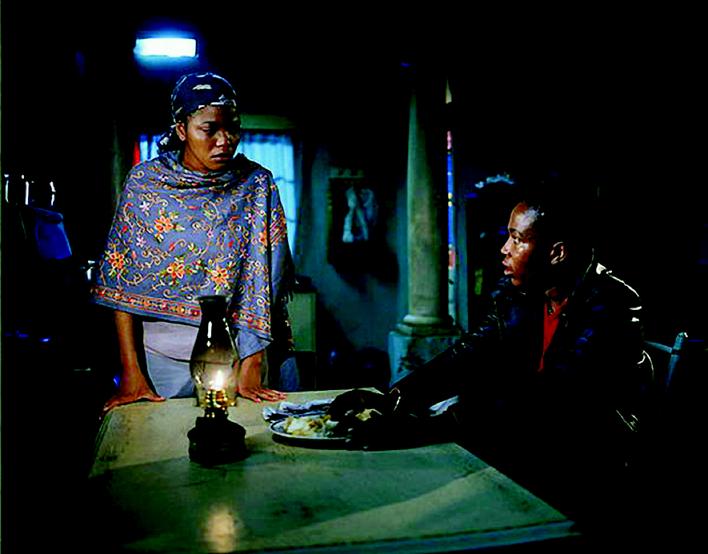While out on one of his many violent criminal exploits, our decidedly unheroic hero shoots a wealthy woman and steals her car. Shortly after acquiring the vehicle, Tsotsi realizes there's a baby strapped into the backseat. He pulls over to the side of the road, ready to ditch the car and its cargo. But, for reasons inexplicable, Tsotsi decides to take the baby with him, dragging the child back to his tin-walled hovel in a paper sack.
As catalysts for change go, little babies and small children are–like a jumbo bag of Cheetos–dangerously cheesy. (See for reference: Little Miss Marker, Three Godfathers, Curly Sue, Three Men and a Baby, Kolya, A Simple Twist of Fate, Central Station, Gloria, Big Daddy, Jersey Girl, Bad Santa, Tokyo Godfathers.) There's nothing like a smiling infant to melt the heart of the meanest miser or the most callous criminal. Over the course of the film, Tsotsi uses newspapers for diapers, dances to Kwaito music to calm the baby and kidnaps a nursing mother at gunpoint for food. Awww. Isn't that cute?
Fortunately–or unfortunately–the baby at the heart of Tsotsi doesn't have such an immediate effect on our protagonist. Tsotsi continues to wander around acting thuggishly for several days while struggling with the thorny moral question of whether or not to return the baby to his rightful parents.
On the scale of Thorny Moral Questions, “Should I return the baby?” ranks right up there with “Should I stop poking myself in the eye with this stick?” Are we to consider our non-hero redeemed by film's end simply because he makes minor moves to redress the major crime he has committed? Frankly, it's a little confusing.
The film unfolds like an idealistic fairy tale, with Tsotsi at the center of a crisis of conscience. We see, in flashbacks, his troubled, abusive, impoverished childhood. This is, I suppose, intended to elicit some sort of sympathy for the guy. But the background only serves to make him exactly like every other member of his poverty-stricken ghetto, several of whom elect not to shoot mothers and kidnap their babies for a living.
Tsotsi is based on the novel by six-time Tony Award-nominated playwright Athol Fugard, who has produced more subtle work on stage. Writer/director Gavin Hood (A Reasonable Man) can't quite figure out how to lift the story above the level of heavy-handed morality play, but he at least keeps things consistent. Actor Presley Chweneyagae puts in a good effort as our main character. With little dialogue, we must rely on the actor's face to express his character's inevitable return to humanity. Chweneyagae is a first-time actor, but he handles the assignment well. His character's emotional growth may be predetermined, but it is sincerely expressed.
The cinematography is, perhaps, the most interesting part of the film, making the entire thing look painfully sunburned. The film's color palate is roasted to a golden brown, with the edges of the film blackened to a pseudo-noir degree. It feels gritty, but it ends up being a faux grit. There's never any doubt that this film will end in grateful smiles and damp hankies.
Some viewers have noted a tonal similarity between this and the Brazilian kiddy gangster saga City of God. (Which, in 2002, wasn't even deemed good enough to be nominated for Best Foreign Film. It went on to garner several nominations, including Best Director in 2003.) Unfortunately, it's a poor comparison. Tsotsi doesn't come close to touching that film's visual and emotional grandeur. To be fair, though, Tsotsi isn't trying to. This is a tighter, more predictable, much more conventional melodrama that will undoubtedly lift the hearts of people whose internal organs are already sufficiently buoyant.



